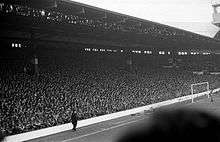Peter Thompson (footballer, born 1942)
Peter Thompson (27 November 1942 – 30 December 2018) was an English footballer. Born in Carlisle, he made 560 appearances in the Football League playing for Preston North End, Liverpool and Bolton Wanderers.[3] He played as an outside left for the Liverpool team which had major successes in the 1960s,[4] and was capped 16 times for England.[1] He was known for his speedy and electric style of play.[5]
.jpg) | |||
| Personal information | |||
|---|---|---|---|
| Full name | Peter Thompson[1] | ||
| Date of birth | 27 November 1942 | ||
| Place of birth | Carlisle, England | ||
| Date of death | 30 December 2018 (aged 76)[2] | ||
| Height | 6 ft 1 in (1.85 m) | ||
| Playing position(s) | Winger | ||
| Youth career | |||
| 1957–1960 | Preston North End | ||
| Senior career* | |||
| Years | Team | Apps | (Gls) |
| 1960–1963 | Preston North End | 121 | (20) |
| 1963–1973 | Liverpool | 426 | (54) |
| 1973–1978 | Bolton Wanderers | 117 | (2) |
| Total | 560 | (63) | |
| National team | |||
| 1964–1970 | England | 16 | (0) |
| * Senior club appearances and goals counted for the domestic league only | |||
As a member of the initial England squad ahead of the 1970 FIFA World Cup, Thompson was involved in the Bogotá Bracelet incident. By some accounts he was in or around the Green Fire jewellery shop when Bobby Moore was alleged to have taken a bracelet. Since 2006 he had been living in Portugal.
Life and career
Preston North End
Peter Thompson was the great schoolboy star of his day – his school was Harraby, Carlisle, playing at inside forward for England and was pursued by 17 clubs when the time came to leave school. He was a legendary winger at Liverpool who could beat defenders for fun and cause absolute havoc to any defender. Thompson became a regular First division player at 17 for Preston, making his debut against Arsenal on 30 August 1960. Chairman Nat Buck was one of the many who raved about him. "I've lost the number of clubs who want him, but how could we sell?" Preston even turned down a bid from Juventus. Bill Shankly had been impressed by the speed and trickery of the young winger during a marathon 5th round FA cup tie between Liverpool and Preston in February 1962 which went to a second replay at Old Trafford before the deadlock was finally broken by Thompson. After 122 League games and 20 League goals for Preston and relegation to 2nd Division after only one season for the youngster in the top-flight he moved to Liverpool for £37,000.
Liverpool
Thompson was a right-footed left winger with skill in abundance. Thompson went straight into the first-team and played in all 42 League games in his first season, thus winning a championship medal as Liverpool won the title by 4 points. He was an important member of the side which won three trophies in the mid-60's, winning another championship medal in 1966 as well being part of the first Liverpool team to win the FA Cup in 1965. He came to Alf Ramsey's attention and won 16 caps. Thomson in 1966 and 1970 was named in the initial World Cup squad of 28 players before losing out both times as one of the "unlucky six".
He started the 1970–71 season in the first-team and played in the opening 16 league matches. He was not a regular starter during the second half of the season although he did come off the bench to replace Alun Evans in the 1971 FA Cup final against Arsenal. He immediately helped to provide Steve Heighway with the opener before losing 2-1 after extra time.
Bolton Wanderers
Knee trouble forced him to consider retirement. When languishing in Liverpool reserves Jimmy Armfield at Second Division Bolton persuaded him to go on loan in December 1973. He signed for the club a month later for £18,000. He retired in April 1978 after having played 132 matches for Bolton who were promoted that season to the top-flight.[6]
After football
After retiring from the game he ran a caravan park for seven years around the Knott End-on-Sea area and then hotels in the Lake District and Harrogate. Thompson died on 30 December 2018, aged 76.[7]
Honours
Liverpool
- First Division champions: 1963–64, 1965–66
- First Division runners-up: 1968–69
- FA Cup winners: 1965[8]
- FA Cup runners-up: 1971[9]
- European Cup Winners' Cup runners-up: 1966[10]
- Charity Shield winners: 1964 (shared), 1965 1966[4]
Bolton Wanderers
- Second Division champions: 1977–78
References
- "Peter Thompson". Englandstats. Retrieved 23 November 2009.
- "Celebrating the Life of Peter Thompson". Lfchistory.net. Retrieved 29 January 2019.
- "Peter Thompson". UK A–Z Transfers. Neil Brown. Retrieved 22 November 2009.
- "Past Player Profile: Peter Thompson". Liverpool F.C. Archived from the original on 9 July 2009. Retrieved 23 November 2009.
- "Peter Thompson obituary". Guardian. 1 January 2019. Retrieved 3 January 2019.
- http://www.liverpoolfc.com/history/past-players/peter-thompson
- Pearce, James (31 December 2018). "Reds legend Callaghan pays tribute to Peter Thompson after death". Liverpool Echo. Retrieved 31 December 2018.
- Macdonald, Neil (14 October 2009). "Key game: Liverpool vs Leeds United, FA Cup final, May 1, 1965". Liverpool Echo. Retrieved 23 November 2009.
- Bevan, Chris (3 January 2007). "Were you there?". BBC Sport. Retrieved 23 November 2009.
- "1965/66: Stan the man for Dortmund". UEFA. Archived from the original on 13 September 2009. Retrieved 23 November 2009.
External links
- Player profile at LFChistory.net
- Stats and photo at Sporting Heroes

.jpg)